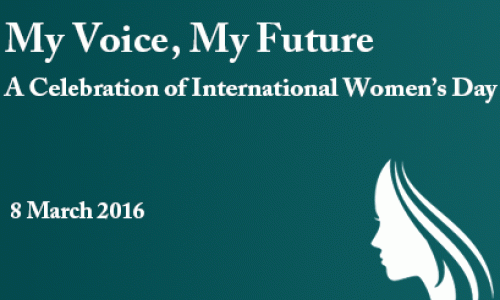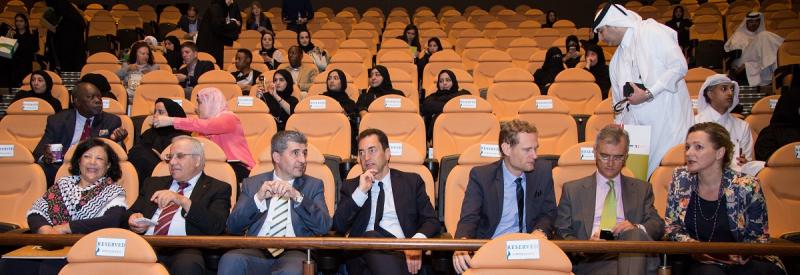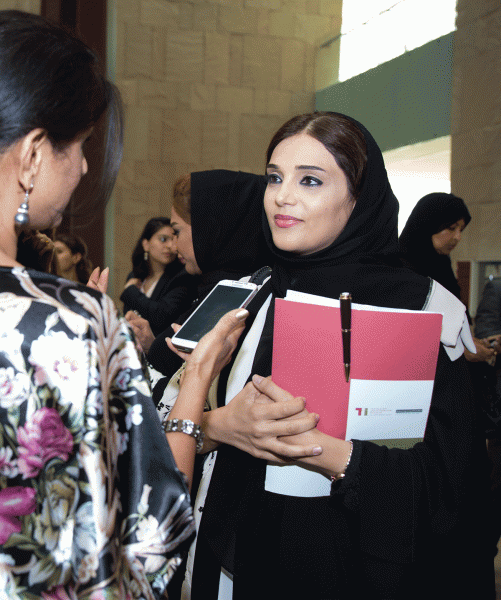
Prominent Qatari Women Speak on Panel at First International Women’s Day Celebration at HBKU: “My Voice, My Future”
Prominent Qatari Women Speak on Panel at First International Women’s Day Celebration at HBKU: “My Voice, My Future”

Hamad bin Khalifa University (HBKU), a member of Qatar Foundation (QF) for Education, Science, and Community Development, welcomed more than 200 members of the community to a special event celebrating International Women’s Day. Organized by HBKU’s College of Humanities and Social Sciences (CHSS) in collaboration with the Doha International Family Institute (DIFI), “My Voice, My Future” featured a panel discussion with five prominent Qatari women from varied professional backgrounds.
The event was attended by a number dignitaries from Qatar and around the world including HE Yvette Burghgraef-van Eechoud, Ambassador of the Netherlands to the State of Qatar, HE Eric Chevallier, Ambassador of France to the State of Qatar, HE Munir Ghannam, the Ambassador of Palestine in Qatar, HE Ignacio Escobar, Ambassador of Spain to the State of Qatar, HE Christophe Payot, Ambassador of Belgium to the State of Qatar, HE Dr. Hamad Bin Abdulaziz Al-Kuwari, the former Minister of Culture, Arts and Heritage, and Dr. Ahmad Hasnah, President of HBKU.

International Women’s Day celebrates the achievements women have made to date worldwide, highlighting their ongoing contributions to cultural, economic, political and social development. The event held at the HBKU Student Center served to highlight the success stories and challenges faced by women in Qatar and around the world, with panelists sharing their personal experiences and offering messages of empowerment with the assembled audience.
In her welcome address, Dr. Al Malki, Founding Dean of Hamad bin Khalifa University’s College of Humanities and Social Sciences, commented on the theme of the event: “Qatari women have achieved milestones during the last two decades, and numbers indicate clearly the increase in female graduates in general and women obtaining higher degrees. The numbers also indicate an increase in the percentage of women in the work force.”


There is an evident increase in the number of women joining professions that were previously male dominated: women entrepreneurs, women journalists, women doctors, women engineers, and much more. But we are more than numbers, aren’t we? Behind each number is a unique story that speaks volumes about the woman and her social and economic context.”
Noor Al Malki, Executive Director of DIFI, also offered opening remarks at the event, reflecting on the need to hear women’s voices: “Sometimes women in our society are reluctant to express themselves - their ambitions, concerns and views - for various reasons. This reluctance, for whatever reason, can prompt others to presume our feelings, concerns and priorities, and act on this misunderstanding on our behalf. To avoid this confusion, women must play a role in correcting these presumptions by expressing their views, their concerns, and their aspirations clearly, using all available means to do so.”
The event invited five prominent Qatari women to share their stories with those in attendance: Dr. Kholode Al Obaidli, former Vice President of National Talent Management within the Human Resources Department at Qatar Airways, Ms. Aysha Al Mudahka, CEO of Qatar Business Incubation Center, Dr. Asma Al-Fadhala, Director of Research at the World Innovation Summit for Education (WISE), Ms. Hanadi Al Darwish, artist and Director of the Visual Arts Center of the Ministry of Culture and Sports, and Ms. Tahani Al-Hajri, Columnist. Ms. Reem Al-Harmi, a well-known Qatari columnist, moderated the discussion and facilitated a lively question and answer session.

Panelists stressed the important role women play in helping achieve the objectives of Qatar National Vision 2030, and the need for all segments of society to work together in service of the country. Dr. Al Obaidli stressed: “What is the best way to celebrate International Women’s Day? Everyone, men and women, can pledge to take a concrete step to achieve gender equality and help women and girls in Qatar achieve their ambitions.”
After the panel discussions concluded, DIFI held three “chat groups” on the topics of women and work, women and the family, and women and the media. Findings from these discussions will be used as part of DIFI’s ongoing research.







